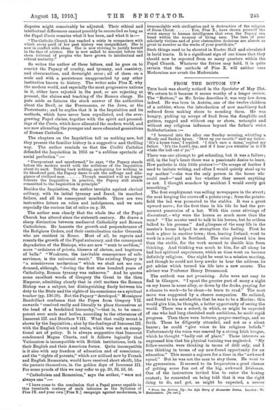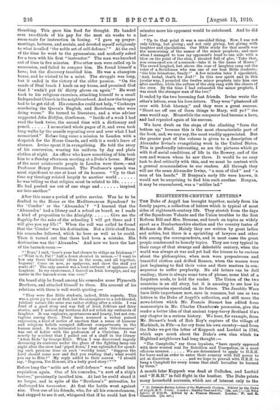FROM THE BOTTOM UP.*
This book was shortly noticed in the Spectator of May 21st.
We return to it because it seems worthy of a longer review. The "Bottom," as Mr. Irvine describes it, was very low down indeed. He was born in Antrim, one of the twelve children of a cobbler, whom the introduction of new machinery had reduced from making shoes to mending them. He was hungry, picking up scraps of food from the dunghills and gutters, ragged and without cap or shoes, untaught and without any religious influence beyond the father's strict Sa bbatarianism
"I bounced into the alley one Sunday morning, whistling a Moody and Sankey hymn. Shut up yer mouth !' said my father. 'It's a hymn tune,' I replied. 'I don't care a damn,' replied my father. 'It's the Lord's day, and if I hear you whistlin' in it I'll whale the hell out o' ye.' "
There was one attempt to get schooling, but it was a failure ; still, in the boy's heart there was a passionate desire to learn. How pathetic is this little picture !—" On scraps of leather I used to imitate writing, and often I would quietly steal up to my mother "—she was the only person in the house whc could read—" and ask her whether they meant anything or not. I thought somehow by accident I would surely get something."
The first employment was selling newspapers in the street; the next keeping the crows off a potato crop ; from the potato- field the lad was promoted to the stables. It was a great upward move ; for the first time in his life he had the per- manent possession of a bat. With this came stirrings of discontent,— why were the horses so much more than the men ? "The master used to talk to his horses, but he seldom talked to his grooms." And glimpses of the easy life in the master's house helped to strengthen the feeling. First he took a place in another town; then, leaving Ireland, went to work in a coal-pit in Scotland. The mine pleased him less than the stable, for the work seemed to disable him from thinking. And thinking was much to him, for all along he had had spiritual experiences, which as time went on became definitely religions. One night he went to a mission meeting, and though he could not keep awake to hear the address, he got advice which turned his life into a new course. The adviser was Professor Henry Drummond.
The outlook was not promising. Jobs were not easy to find in Glasgow. "I spent the greater part of many a night on my knees in some alley, or down by the docks, praying for
a chance to work—to be clean—to learn to read." The next move was suggested by a chance companion. He enlisted,
and found to his satisfaction that he was to be a Marine ; this would give him, he thought, a better opportunity of seeing the world. There was a school, in which, as might be expected of one who had long cherished such ambitions, he made rapid progress. Then there were lectures, prayer-meetings, and so forth. These he diligently attended, and not as a silent hearer ; he could "give voice to his religious beliefs." Unfortunately the voice was marred by a strong Irish brogue, which he thought "badly out of place." These interests so engrossed him that his physical training was neglected. "My fellow-recruits were thinking in terms of drill only, and I was thinking in terms of my new-found opportunity for an education." This meant a sojourn for a time in the" awkward squad." But he was not the man to stay there. He went to the gymnasium. It seemed to its frequenters a good chance of getting some fun out of the big, awkward Irishman. One of the instructors invited him to enter the boxing contest ; he consented on being told that it was the right thing to do, and got, as might be expected, a severe
• From tha Bottom Up: the Life Story of Atesander Irvine. London: W. Heinemann. 16e. net.]
thrashing. This gave him food for thought. He handed over two-thirds of his pay for the next six weeks to a
room-mate for instruction in boxing. "I gave up prayer- meetings, lectures, and socials, and devoted myself religiously
to what is called the noble art of self-defence.'" At the end of the time he went to the gymnasium, and modestly asked for a turn with his first "instructor." The man was knocked out of time in five minutes. Five other men were called up in succession, and failed to conquer him. He found himself a hero ; but the discovery troubled him. He was a champion boxer, and he wished to be a saint. The struggle was long,
but it ended in the victory of the older passion. "On the sands of Deal beach I knelt on my knees, and promised God that I wudn't put th' dhirty gloves on again.'" He went back to his religious exercises, attaching himself to a small
Independent Church in the neighbourhood. And now the brogue had to be got rid of. His comrades could not help, "Cockneys murdering the Queen's English, and Scotchmen who were doing worse." He turned to literature, and a wise adviser
suggested John Halifax, Gentleman. "Inside of a week I had
read the book twice, the second time with a dictionary and pencil I memorized whole pages of it, and even took long walks by the seaside repeating over and over what I had memorized." Before long came a mission to London with a despatch for the Horse Guards, and with it a week's leave of absence. Irvine spent it in evangelising. He told the story of his conversion, wearing his uniform by day and plain clothes at night. An officer who knew something of him took him to a Sunday afternoon meeting at a Duke's house. Many of the most aristocratic people in London were there,—and Professor Henry Drummond. The Professor's speech was most significant to one at least of its hearers. "Up to that time my theology related largely to another world he was telling us that religion must be related to life He had pushed me out of one stage and inspired me into another."
After this came a period of active service. Was he to be
drafted to the Home or the Mediterranean Squadron? to the 'Condor' or the 'Alexandra' P "I learned that the 'Alexandra' had a library and a school on board, so I made
a kind of proposition to the Almighty Give me the flagship for the sake of the schooling I will get there and I
will give you my life !" When the roll was called he found that the 'Condor' was his destination. Not a little chaff from his comrades followed, which he bore as well as he could.
Then it turned out that there had been a mistake. His destination was the Alexandra.' And now we have the last of the barrack-room:—
" 'Boys,' I said, here's your last chance to oblige an Irishman !' What is it, Pat ? ' half a dozen shouted in unison.—' I want to box any three blinderin' idiots in the room, and all together, begorra! Come on now, ye spalpeens, and show the stuff yer made of!' The only answer was a loud outburst of applause and laughter. In my exuberance, I danced an Irish hornpipe, and my career in the barrack-room was over."
On board ship he found among his comrades some Plymouth Brethren, and attached himself to them. His account of his relations with them is well worth quoting :—
" They were fine Bible students, indeed, Bible experts. This was a great joy to me at first, but the atmosphere to a red-blooded, jubilant nature like mine was rather stifling after a while. I was fond of a good story and was full of Irish folklore and fairy stories, and I noticed my brethren did not relish my outbursts of laughter. It was explosive, spontaneous and hearty, but not con- tagious among them. Their faces assumed a rather pained expression, a kind of notice of emotion that a sense of humour and religious beliefs occupied different compartments in the human mind. It was intimated to me that such frivolousness' was out of kelter with the profession of a Christian. It was merely by accident that I pulled out of a shelf in the library Adam Bede' by George Eliot. When I was discovered eagerly devouring its contents under the glare of the fighting lamp one night after the crew had 'piped down,' I was upbraided for spend- ing such precious time on such worldly trash." Suppose the Lord should come now and find you reading that; what would
you say to Him ? ' My reply added to their sorrow. should say, "Bogorra, Yer Honour, it's a bully good story !
-Before long the "noble art of self-defence" was called into requisition again. One of his comrades, "a sort of a ship's bruiser," persistently insulted him. At last he could stand it no longer, and in spite of the "Brethren's" entreaties, he challenged his tormentor. At first the battle went against him. Then one of his friends, who, for all his remonstrances, had stopped to see it out, whispered that if he could last five minutes more his opponent would be outclassed. And he did last :—
" Up to that point it was a one-sided thing. Now, I was not only taking, but giving; and not only giving, but giving with laughter and ejaculations. Our Bible study for that month was the memorizing of the names of the minor prophets ; and once when I managed to toss my opponent's head to one side with a blow on the point of the chin, I shouted full of glee, Take that., you cross-eyed Bon of a seacook—take it in the name of Hosea!' The crowd laughed, but above the roar of laughter rang out the voice of a Sc,otchman who was one of our best Bible students : Gie him brimstone, Sandy !' A few minutes later I ejaculated, 'And, bedad, that'-s for Joel !' In this new spirit and in this jocular way, I pounded the twelve minor prophets into him one after another, while the rafters of the ship rang with the cheers of the crew. By the time I had exhausted the minor prophets, I was much the stronger man of the two."
It ended by the two becoming fast friends. Irvine wrote the
other's letters, even his love-letters. They were "plastered all over with Irish blarney," and they were a great success. "Shoot me off one of them things to Mary, will ye P" the man would say. Meanwhile the conqueror had become a hero, and had repented again of his success.
We have dwelt on the steps of the climbing "from the bottom up," because this is the most characteristic part of the book, and, we may say, the most readily appreciated. But
the greater part of the volume is given to a description of Alexander Irvine's evangelising work in the United States.
This is profoundly interesting, as are the pictures which go with it of social conditions, of life in the Bowery, and of the
men and women whom he saw there. It would be no easy task to deal critically with this, and we must be content with a general commendation to our readers. All through they will see the same Alexander Irvine, "a man of God" and "a
man of his bands." If Bunyan's early life were known, it
would not be surprising to find him such another. Bunyan, it may be remembered, was a "soldier lad."







































 Previous page
Previous page